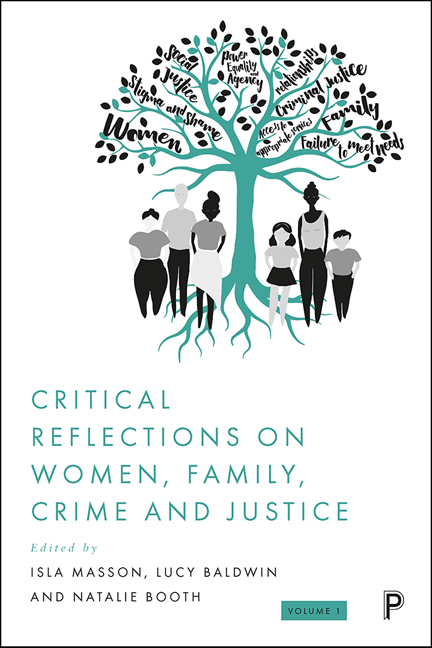Book contents
- Frontmatter
- Contents
- List of figures
- Notes on the contributors
- Acknowledgements
- Foreword: critical reflections from the Women, Family, Crime and Justice network
- 1 Starting the conversation: an introduction to the Women, Family, Crime and Justice network
- 2 Playing the game: women and community punishment
- 3 Harmful social and cultural practices that exist within South Asian communities in the UK and their impact on women
- 4 Exploring shame, love and healing within women’s recovery: an analysis of a trauma-specific intervention
- 5 Reducing the enduring harm of short terms of imprisonment
- 6 ‘Without it you’re lost’: examining the role and challenges of family engagement services in prisons
- 7 What are the challenges and opportunities for schools in supporting children of people in prison?
- 8 Impact and engagement work in the context of families of people in prison
- 9 Presence, voice and reflexivity in feminist and creative research: a personal and professional reflection
- 10 Service users being used: thoughts to the research community
- 11 Continuing the conversation: reflections from the Women, Family, Crime and Justice network
- Index
7 - What are the challenges and opportunities for schools in supporting children of people in prison?
Published online by Cambridge University Press: 21 December 2021
- Frontmatter
- Contents
- List of figures
- Notes on the contributors
- Acknowledgements
- Foreword: critical reflections from the Women, Family, Crime and Justice network
- 1 Starting the conversation: an introduction to the Women, Family, Crime and Justice network
- 2 Playing the game: women and community punishment
- 3 Harmful social and cultural practices that exist within South Asian communities in the UK and their impact on women
- 4 Exploring shame, love and healing within women’s recovery: an analysis of a trauma-specific intervention
- 5 Reducing the enduring harm of short terms of imprisonment
- 6 ‘Without it you’re lost’: examining the role and challenges of family engagement services in prisons
- 7 What are the challenges and opportunities for schools in supporting children of people in prison?
- 8 Impact and engagement work in the context of families of people in prison
- 9 Presence, voice and reflexivity in feminist and creative research: a personal and professional reflection
- 10 Service users being used: thoughts to the research community
- 11 Continuing the conversation: reflections from the Women, Family, Crime and Justice network
- Index
Summary
Introduction
It is estimated that there are 341,900 children in England and Wales who ‘are/will be affected by paternal and maternal imprisonment … in 2020’ (Kincaid et al, 2019, p 20). It is most likely that the children who fall into this group will have experienced the imprisonment of their father, since the prison population in the UK is 95 per cent male (Prison Reform Trust, 2018). However, more recently, research by Baldwin and Epstein (2017), Minson (2018), Beresford (2018) and Masson (2019) has specifically looked at the effects of maternal imprisonment on children. Findings repeatedly show that few children remain in the family home when their mother is imprisoned, because the mother is usually the primary carer. While it is acknowledged that outcomes may be adverse for any child experiencing parental imprisonment, having a mother imprisoned may cause more negative outcomes for the child than having a father imprisoned.
However, despite the significant numbers of children estimated to be experiencing familial imprisonment, largely these children continue to remain a hidden group. It is suggested that schools appear to be unaware of children in their communities who may be affected, or, seemingly, choose not to engage with this as an issue (Shaw, 1992, cited in Morgan et al, 2013b). While schools remain largely ill-informed as to the children in their communities affected by familial imprisonment, this is not an issue specific to schools but rather, there is a lack of information regarding these children across all agencies and it is well established that there is ‘no systematic identification of children of prisoners’ (Kincaid et al, 2019, p 11) or their needs. The Joint Committee on Human Rights report in relation to children whose mothers are in prison states ‘it is not clear from the evidence we have received whether women entering prison are always asked whether they have dependent children’ (House of Commons and House of Lords Joint Committee on Human Rights, 2019, p 13). Although this report refers to women, it can be assumed that this same oversight can be applied to the children of men in the criminal justice system and despite the system noting ‘the presence of children at different stages [of their parent's journey through the criminal justice system] their wellbeing remains in many cases ignored’ (Kincaid et al, 2019, p 23).
- Type
- Chapter
- Information
- Critical Reflections on Women, Family, Crime and Justice , pp. 129 - 152Publisher: Bristol University PressPrint publication year: 2021



